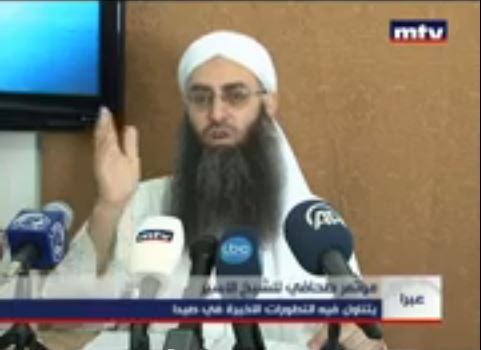 Sheikh Ahmed al-Assir in a press conference before his escape. (MTV)
Sheikh Ahmed al-Assir in a press conference before his escape. (MTV)
Estimation of the current situation in Lebanon – Part 1
Summary
Fears of escalating violence are rising in the Levant, after three car bombs struck Lebanon, the tiny neighbour of Israel and Syria, in just one week. Will that change the current situation in Lebanon basically? We don´t think so – but several other factors could.
Car bombings in Beirut and Tripoli
Thursday, August 15, a car bomb went off in the Beirut neighbourhood of Dahiyeh, a stronghold of the Lebanese Shiite organisation Hezbollah. At least 24 people were killed and more than 120 wounded. The perpetrators remain at large, though the basic and most rational assumption is, Syria-related Sunni extremists are responsible.
One week later, on Friday, August 23, two bomb-laden cars detonated in the Sunni-dominated northern city of Tripoli and took the lives of at least 42 people, harming 500, many of them severely. Victims for the big part were worshippers, who left two Sunni mosques after traditional Friday prayer. The explosive devices were placed next to both holy places.
It was the most deadly day Lebanon has witnessed since 1990, the year that marked the end of the country´s civil war.
Fears of sectarian strife
Fears are rising now in Lebanon and the region that the situation might get out of hand and tit-for-tat bombings could drag the country into a sectarian strife or even war between Shiites and Sunnis, and Lebanon might be deeply pulled into the Syrian civil war that is raging on for more than two years.
Sunnis in no position for strife
We don´t think the time is ripe for such a scenario and we don´t think it is in the near future. Shiites and Sunnites will not jump at one another´s throat because of that. The basic line here is relatively simple: A Shiite-Sunnite strife can´t happen easily because Lebanon´s Sunnis are in no position for that. The country´s Christians are out of the picture anyway, and the Lebanese people is tired of conflicts and war.
The Assir battle in Saida
At the end of June, the Lebanese army – most probably with the help of Hezbollah elements – did smoke out the most outspoken Sunni militant in the country, Sheikh Ahmed al-Assir, in his Bilal Bin Rabah mosque stronghold, located in a suburb of the Sunnite dominated southern city of Saida (Sidon).
Scores of his militant followers were killed, and Assir is at large since, possibly hiding in one of several Palestinian refugee camps. Reports say, he fled to the Saida camp Ein el-Helweh, which is known for hosting several fundamentalist and militant Sunnite groups, which engage in in-fighting regularly.
Intention to bog down Hezbollah
The intention of the recent bombings – according to our reading – is relatively clear: The Syrian opposition is loosing ground and wants to tie down Hezbollah in Lebanon, thus exhausting its resources and forcing it to refocus on its home turf. The Beirut/Dahiyeh bombing – from our point of view – points in that direction.
The Tripoli bombing, which cost the lives of at least 45, is more difficult to sort out, though its intention is most likely similar: Somebody is trying to cause havoc, ignite strife in Lebanon in order to force Hezbollah out of Syria by any means or impede its performance, which – by all public accounts – is causing Syrian rebels huge problems and might even be decisive in the war for Syria.
This is an estimation of possible future developments that we anticipate. In the next part of this series we will explain why Lebanon´s domestic Sunnis have traditionally lacked militant leaders and what this means for the current situation of the country.
